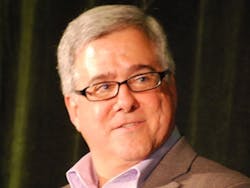People Issues, Policy Uncertainties Headline Power Industry Concerns
The panel discussion was moderated by Allen Burdett, ABB's senior vice president for business development, and included Mike Heyeck, senior vice president for transmission at AEP, Paul Wyman, general manager, smart grid solutions for Lockheed Martin, and Ron May, senior vice president of DTE Energy.
"What is most important in any company is people," said AEP's Heyeck. "We have in our company the same kind of human performance initiative that the nuclear power industry has. We've been working on the issue of the aging workforce for fifteen years, with a co-op program for young engineering students. We've found that the key to the program is that you have to hire them…otherwise you and your company are poison at that school."
Lockeed Martin's Paul Wyman agreed. "Our primary customer is the federal government, and we are often sending people into harm's way. We have to make sure that we provide the backup and in-country service and support that will keep them safe. We just did an early retirement program, and 600 of our older workers left. This allowed us to make room for younger people to be promoted. We also do co-op, as well as an engineering leadership program, and we support STEM education projects as much as we can."
Ron May from DTE Energy said, "DTE as Detroit Edison has been around 100 years, and our Michigan Gas subsidiary has been around 150 years. All of our ongoing activities are generated by the employees that we have. Programs are in place to train and maintain our workforce. "For example," he said, "in 2009 we weren't laying off, even when General Motors was in bankruptcy. Our people are an asset. Our safety rating is an OSHA-recordable 0.7, where the general construction industry for example is 5.0, and where the nuclear industry is 0.1. Basically we are doing very well, but not as well as we want to be on safety."
Ron May responded that no cogent energy policy hurts long term investment. "We don't know what long term policy will be, so we don't know what to invest in," he said. "We need decisions on oil policy, nuclear policy and grid investment."
Heyeck agreed, "But as Joe Hogan said in his keynote this morning, this is not a problem; it is an opportunity. We have all-time record coal exports. We have good penetration in most states for renewables. The states have taken charge of setting energy policy. I don't think we are as dysfunctional as your friend thinks. I am a student of history, and when you think back to the Jackson v. Adams campaign, and the others, it isn't any more dysfunctional than it was back then—we just hear about it 24/7 from the media. Texas is an example of what you can do when regulatory agencies and requirements are pared down. They wanted many gigawatts of wind power, and they went out and did it. This is an example of government not being dysfunctional."
"We support any regulatory climate," Paul Wyman interjected, "that exists. Our customers drive our investment decisions. If we wait for the federal government to make policy before we make investments, we'd never get anything done."
"What about NERC (National Electrical Reliability Corporation)?" Burdett asked.
Heyeck responded, "Reliability is in our blood at AEP. Conceptually, the NERC CIPs are okay, but they are way too prescriptive. If NERC becomes more like the nuclear industry, we may have an asset here, but we are early in the process. Ron May agreed. "We don't have a transmission company at DTE, but we all have a sense of urgency toward the CIPs and other reliability requirements. What we need is an even-handed smart mechanism for ensuring reliability."
"What about cybersecurity?" Burdett asked. "You are all high value targets."
"Oh, we get attacked," Wyman said. "Over 400 times a day. But what's significant? We have to create systems and tools that can filter threats that don't matter and concentrate on those that do. We are confidentially threat-sharing with 17 utilities including AEP, with NIST and with NERC. But as far as the CIPs are concerned, we have to remember that compliance does not always equal improved security."
May agreed. "We get attacked all the time. Cyber- and physical security are very important, especially in our nuclear plants."
"This is a continuing battle," Heyeck said. "We have to watch out for control systems, and the government has to talk to us in a quicker way. The more reliant we become on technology, the more we have to design new mechanisms against cyber attacks, solar storms and whatever. We can't stand still."
"What keeps me up at night?" Heyeck said. "Nothing. It is all about what you're doing about it." Wyman agreed. "Mitigation strategy is critical," he said.
"For me," Ron May said, "dealing with what keeps me up at night is all wrapped around what we do about it. The drivers are customer satisfaction and customer service and how to keep making it better."
About the Author
Walt Boyes
Walt Boyes

Leaders relevant to this article:



